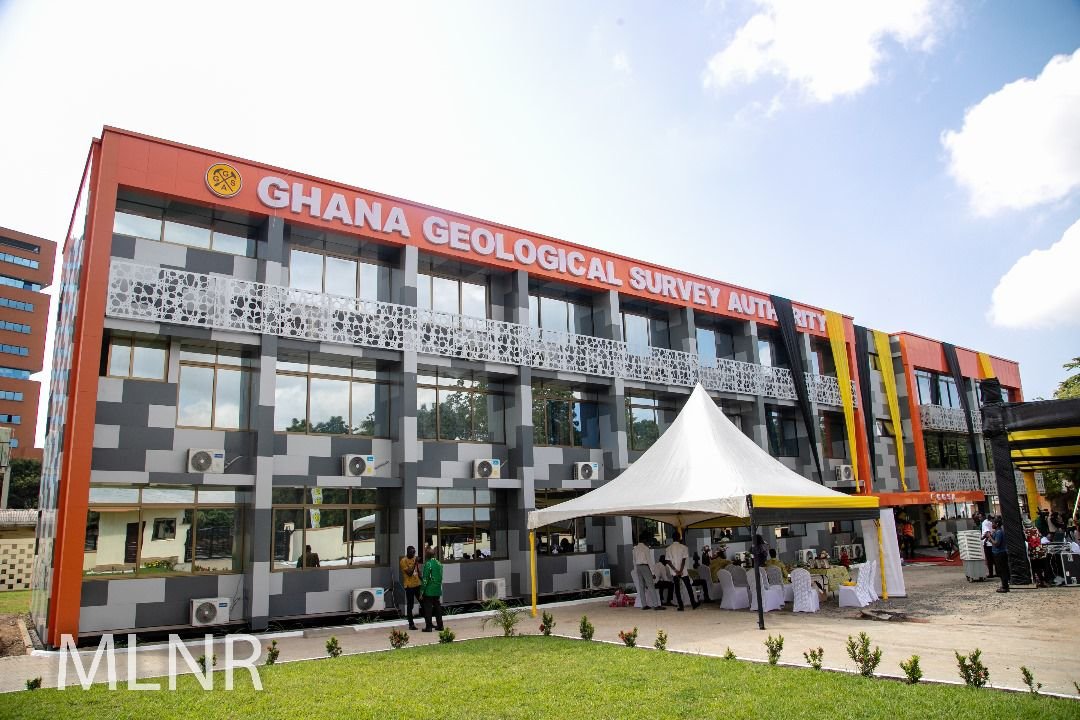
Newly renovated head office of the Ghana Geological Survey Authority
By Bright Philip Donkor
The government, through the Ministry of Lands and Natural Resources, yesterday commissioned the newly renovated head office of the Ghana Geological Survey Authority (GGSA) in Accra to propel development in Ghana’s extractive sector.
The upgraded facility, now equipped with advanced technological infrastructure, is expected to bolster the GGSA’s role in driving mineral resource exploration and revamping the small-scale mining sector.
Speaking during the commissioning ceremony, the sector Minister, Samuel Abu Jinapor, commended the management and staff of the GGSA for their diverse roles in the renovation process.
Commitment
Mr. Jinapor said the modernisation of the GGSA office was a recognition of its important value to the country’s extractive sector. He added that it was significant milestone in the government’s commitment to promoting effective management of the country’s natural resources.
He mentioned the construction of Ultra-modern district and regional offices for the Minerals Commission. He explained that these were part of a holistic plan by the government to ensure that state institutions operate in an environment that motivates them to deliver on their mandate consistently.
The Minister emphasised the role of geological investigations in the country’s extractive sector. He noted that the challenge of illegal small-scale mining would not have existed in its current form if the country had a well-resourced and robust geological survey department.
He explained that the GGSA had, since its establishment, contributed immensely to the country by providing data that forms the scientific foundation for understanding and exploiting the country’s natural resources.
Beyond
Mr. Jinapor said aside the duties of GGSA such as investigations into seismic activities and the mining sector, the work of the Authority extends to areas such as water, energy and construction.
He, therefore, reaffirmed government’s support to ensure that the GGSA delivers on its mandate. He charged the management and staff of the GGSA to revive their efforts and activities to help the country as the government charts a path toward harnessing green mineral resources.
“We commission this refurbished edifice for the GGSA to provide a conducive environment for our efforts towards effective, efficient, and sustainable management and utilization of the mineral resources of our country. The mining industry thrives on geological investigations, and without geological investigations, you can’t have a mining industry. The GGSA has, since its establishment, played a critical role in our country, providing the scientific foundation necessary for understanding our natural resources. The work of the authority goes beyond the mining sector to encompass water, energy, agriculture, and construction industries,” he indicated.
Appreciation
For his part, the Director General of Ghana Geological Survey Authority (GGSA), Isaac Mwinbelle, expressed gratitude to the Ministry of Lands and Natural Resources and its leadership under Mr. Samuel Abu Jinapor, for advancing GGSA’s role in Ghana’s socio-economic growth.
He highlighted the transition of GGSA from a department to a fully-fledged authority. He acknowledged the Lands Ministry’s role in positioning GGSA to make meaningful contributions to national development.
Brief history
He noted that GGSA was initially established as the Gold Coast Geological Survey in 1913, later becoming the Geological Survey Department. He said it officially transformed into the Ghana Geological Survey Authority in 2016 under Act 928, with a broadened mandate to advise, promote, and conduct research on geoscientific matters.
He explained that these areas spanned mineral resources, groundwater, environmental issues, geo-hazards, and land-use planning—all crucial to Ghana’s sustainable development.
“GGSA operates as a public agency under the Lands Ministry, with a network spanning nine of Ghana’s sixteen regions: Accra, Kumasi, Saltpond, Koforidua, Tamale, Ho, Takoradi, Bolgatanga, and Sunyani. As the Authority celebrates its 111th year, the Director General emphasized the necessity of reflecting GGSA’s elevated status through a facelift of its office infrastructure,” he stated.
This effort, he indicated, aligns with President Nana Addo Dankwa Akufo-Addo’s vision for effective governance and institutional presentation.
He revealed that, in collaboration with the MLNR and the GGSA Governing Board, management contracted Ghanaian firm FAWCO Ltd., with PWD Prestige acting as consultants, to oversee the renovation, meeting all procurement standards. He noted that after nine months of dedicated work, the project was completed on schedule.
Mandate
The Director General noted the Authority’s role in conducting geological surveys to identify valuable mineral resources. “The agency’s work provides essential geoscientific data for government and industry, particularly benefiting the mining, oil, and gas sectors. These sectors rely heavily on GGSA data as a foundational resource, driving significant economic activity in the country,” he added.
He also pointed to the impact of small-scale mining, acknowledging the role GGSA plays in supporting responsible and sustainable mining practices. “Small-scale mining is critical to both national and regional economies,” he said, noting that recent policies are increasingly focused on sustainable practices within the sector.
In this context, he highlighted a partnership with the World Bank, which, through the Ghana Land and Resource Support for Small-scale Mining Project (GLRSSMP), aids GGSA in mapping mineralized zones to guide small-scale miners. He said the initiative sought to bolster the mining sector’s environmental sustainability, offering small-scale miners improved geological data to inform their activities.
He expressed optimism that, with continued government support, GGSA would expand its geological investigations nationwide, providing critical data to the extractive industries for Ghana’s socio-economic development.





